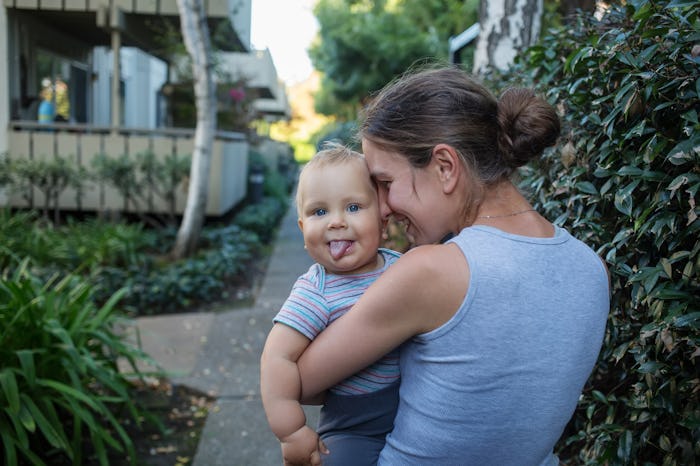Life

Here's How Parents Affects Kids' Math Skills, According To Science
My twins might only be in kindergarten, but as someone who is embarrassingly bad at math, I already know it won't be long before their homework starts to stump me completely. Like many parents though, I'd like my children to be comfortable with numbers and confident in their math skills, so the findings of a recent study published by researchers in Belgium actually feel super-encouraging. The study found that letting your kids help teaches them early math skills at home, highlighting the kinds of easy, everyday activities parents can do with their children to help them develop numeracy awareness and better number processing. So while I may not end up being much help when they start to bring home long division worksheets, it's valuable to know that there are lots of other ways to set them up to be future math whizzes — and that implementing those strategies into our lives won't actually be very difficult.
The study, published Thursday in Frontiers in Psychology, and reported on by Science Daily, provides some useful insight into the ways that parents affect their children's math performance at school, and the findings are pretty eye-opening. While it was already well-established that children who have been taught early math skills at home usually do better at math in school, and also that parents can absolutely influence their kids' math skills development, the specific things parents can do to help weren't exactly clear. Should you be buying flash cards? Playing number games? Teaching addition and subtraction using M&Ms?
To find the answer, researchers studied 128 kindergarten children between the ages of 4 and 6 years old, along with their parents. The children performed a series of math-related tasks, while their parents filled out questionnaires about the kinds of activities they do at home with their kids. And while it wasn't surprising that there was a correlation between parent-child interaction and the children's aptitude, they also found that, actually, parents may not have to formally "teach" some types of early math skills to their young children at all.
The study's lead author, Belde Mutaf Yildiz, said that while different home activities corresponded to different types of math-related learning, everyday tasks like "talk about money when shopping or measuring ingredients while cooking," could help improve children's understanding of important mathematical concepts.
That's great news if you're like me, and are absolutely not even sort of the type of parent who spends time specifically teaching academic skills from workbooks. Math is all around us at all times, after all, and kids can still learn a lot from the kinds of things they do with mom and dad each day. Yet that doesn't mean that more formal attempts at teaching weren't helpful: Mutaf Yildiz also explained that things like "identifying numerals, sorting objects by size, color, or shape, or learning simple sums," helped children earn higher scores on the study tasks.
In fact, while teaching these early math skills might not seem hugely important when you have a 4-year-old, they do seem to have a big impact overall. A 2016 study led by Vanderbilt University psychology professor Bethany Rittle-Johnson looked at the connection between children's emerging math skills at age 4 and their performance at age 11, according to The Tennessean, and the findings suggested that children who have a "broader range of math knowledge" in pre-K tended to do better at math when they are older as well.
That might have important implications for teaching and school curriculums, but it can also be really valuable to parents, too. If parents can teach their young children a range of early math skills through a combination of daily life activities, as well as things like counting games, sorting, or learning basic addition and subtraction, it seems like it could set them up for good results down the road.
As for mathematically challenged parents like me? These findings provide a little bit of hope that, while I may not be able to provide much assistance when they get a bit older, I can at least encourage their learning now, and let their teachers take it from there.
Check out Romper's new video series, Bearing The Motherload, where disagreeing parents from different sides of an issue sit down with a mediator and talk about how to support (and not judge) each other’s parenting perspectives. New episodes air Mondays on Facebook.